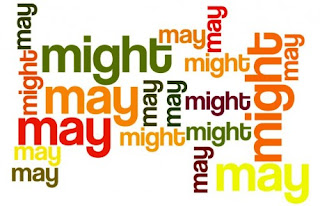We use May when we are asking for permission.
May I come in please?
May I borrow your bicycle this afternoon?
May I sit here please?
Youmayn't may not leave until you finish your work.
You may not smoke in here.
We use May when you are not sure or to talk about the possibility of something.
It may rain today.It mays to rain. is incorrect.
I may go to the United States next month if it's possible.
There may be a lot of cars on the road right now.
I'm so busy today, I may not have time to work out.
May I come in please?
May I borrow your bicycle this afternoon?
May I sit here please?
You
You may not smoke in here.
We use May when you are not sure or to talk about the possibility of something.
It may rain today.
I may go to the United States next month if it's possible.
There may be a lot of cars on the road right now.
I'm so busy today, I may not have time to work out.
We use Might to ask for permission which is more polite than May.
Might I interrupt you a moment?
Might I go home now?
Might I go out with you please?
I wonder if I might have another cup of coffee?
We use Might to talk about the possibility of something. Might suggests less likelihood than May. The usage is much the same.
It might rain today.
She might be at the library now.
I mightn't have time to work out.
We use Might to talk about the past tense of May in asking for permission.
John wanted to know if he might smoke there.
I asked Susan if she might lend me some money.
Might I interrupt you a moment?
Might I go home now?
Might I go out with you please?
I wonder if I might have another cup of coffee?
We use Might to talk about the possibility of something. Might suggests less likelihood than May. The usage is much the same.
It might rain today.
She might be at the library now.
I mightn't have time to work out.
We use Might to talk about the past tense of May in asking for permission.
John wanted to know if he might smoke there.
I asked Susan if she might lend me some money.
Note: Let's see these sentences:
Can I join you at the party tonight?
= You use Can when you speak with your friends.
May I have your name?
= You use May or Might when you speak with strangers or someone you don't know well.
Note 2: Let's consider this sentence:
You mightn't leave until you finish your work is wrong.
May not can be used of something that is not permitted.
Might not can't be used like that.
It always means that it is possible that something will not happen.
You might not leave means that it is possible that you will not leave.It has nothing to do with permission. -A big Thanks to Oliver Pereira.

This is a good summary of how these words are used in English. However, I have noticed a few mistakes. I thought I would help you out by telling you about them.
ReplyDelete"Learning English Grammar and English Sentence in Daily Life" doesn't make sense. If you are learning specific examples of sentences, then you are learning English sentences (plural). If you are just learning how to put sentences together, then you are learning English sentence structure. Also, you are not learning them in daily life. You might be learning how sentences are used in daily life, or you might be learning sentences for daily life.
"May and Might are the auxiliary verb" is wrong. There are two verbs there. "Verbs" is the plural of "verb". You should say, "May and might are auxiliary verbs".
"as Should,Ought to,Will" should be "as are should, ought to, and will".
"We use May when you are not sure about something" is wrong. The subjects must agree. Either we use it when we are not sure, or you use it when you are not sure.
"You may not leave until you finish your work." This is about permission rather than possibility. You are saying that even if it is possible for you to leave, you do not have permission to.
"We use Might to talk about the possibility of something but It's smaller possibility than May." Try, "We use might to talk about the possibility of something. Might suggests less likelihood than may."
"But In the usage, it' almost not different." Try, "The usage is much the same."
However, "You mightn't leave until you finish your work" is wrong. "May not" can be used of something that is not permitted. "Might not" can't be used like that. It always means that it is possible that something will not happen. "You might not leave" means that it is possible that you will not leave. I has nothing to do with permission.
"Can I join you the party tonight?" should be "Can I join you at the party tonight?"
I hope that helps!
Thank you so much for visiting our website. It was very kind of you to correct this article many mistakes. (I don't think there are a few mistakes. hahaha ^_^ )
DeleteI've learned a lot from your suggestion and I will correct them soon.
They are all very useful.
Thank you.